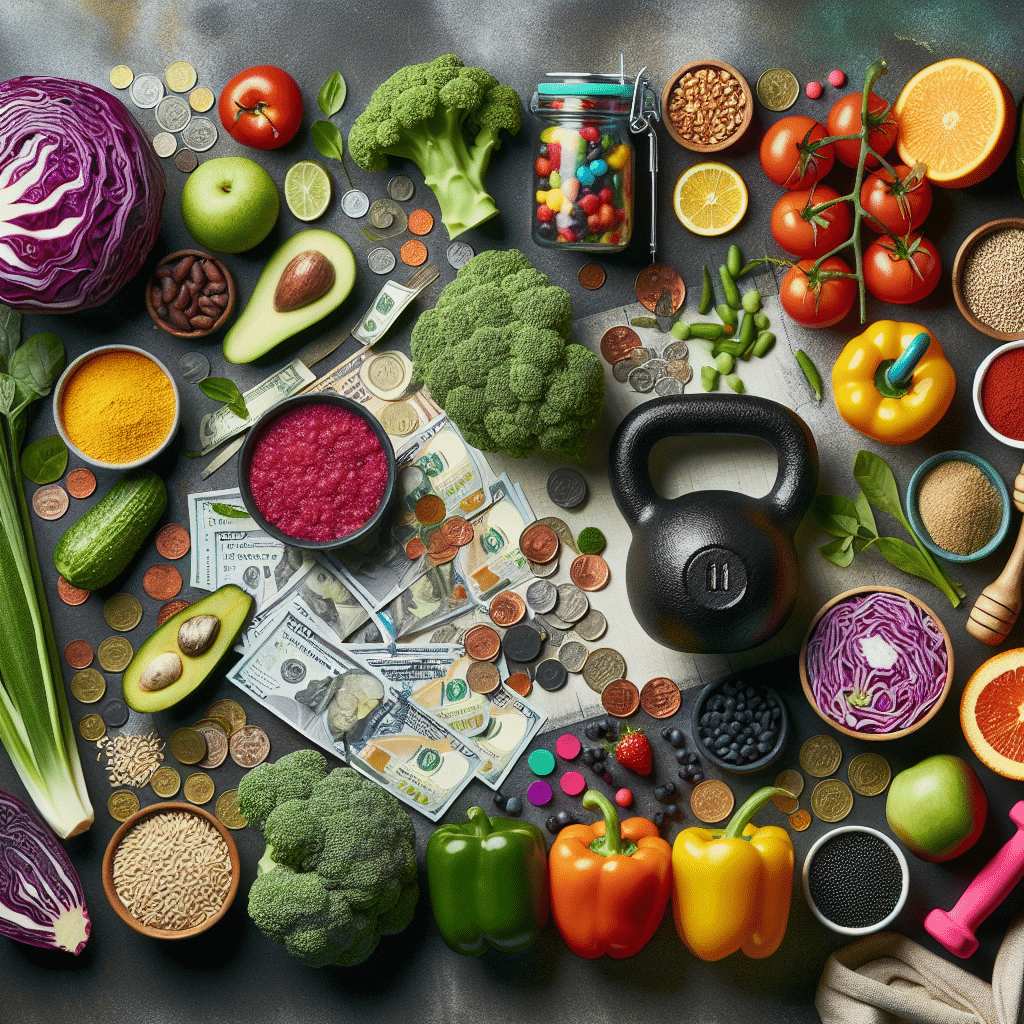Vegan Meal Plan for Fitness Enthusiasts on a Budget
Understanding the Vegan Diet
Switching to a vegan diet can be a powerful choice for health and wellness. It emphasizes plant-based foods that are rich in nutrients essential for energy and recovery. For fitness enthusiasts, a well-planned vegan meal plan helps improve athletic performance, supports muscle recovery, and aids in overall health—all while being budget-friendly.
Budget-Friendly Protein Sources
-
Lentils: Packed with protein and fiber, lentils are an economical choice. A 1-cup serving yields about 18 grams of protein and costs roughly $0.20-$0.30.
-
Chickpeas: Versatile and nutrient-dense, chickpeas provide 15 grams of protein per cup and can be purchased dry or canned affordably.
-
Tofu: A great source of complete protein, tofu offers about 20 grams of protein in a 3.5-ounce serving. Prices range around $2-$3 per block.
-
Peanut Butter: Cost-effective and nutritious, 2 tablespoons of peanut butter contain 8 grams of protein for approximately $0.10.
-
Quinoa: This pseudo-grain provides all nine essential amino acids, yielding 8 grams of protein per cooked cup, at about $1.
-
Black Beans: A staple in many vegan diets, black beans are rich in protein (15 grams per cup) and fiber, often costing around $0.80 for canned options.
Sample Vegan Meal Plan
Day 1
Breakfast: Overnight Oats
- Ingredients: Rolled oats, almond milk, chia seeds, sliced banana, and peanut butter.
- Approx. Cost: $1.00
- Protein: 10 grams.
Snack: Hummus and Carrots
- Ingredients: Store-bought hummus and baby carrots.
- Approx. Cost: $0.80
- Protein: 3 grams.
Lunch: Chickpea Salad
- Ingredients: Canned chickpeas, diced cucumber, cherry tomatoes, lemon juice, and spices.
- Approx. Cost: $1.50
- Protein: 15 grams.
Snack: Apple with Peanut Butter
- Ingredients: Sliced apple with 2 tablespoons of peanut butter.
- Approx. Cost: $0.60
- Protein: 8 grams.
Dinner: Lentil Stir-Fry
- Ingredients: Cooked lentils, mixed vegetables (frozen), and soy sauce.
- Approx. Cost: $1.50
- Protein: 18 grams.
Total Protein for Day 1: 54 grams
Approx. Daily Cost: $5.40
Day 2
Breakfast: Smoothie Bowl
- Ingredients: Spinach, banana, frozen berries, and almond milk.
- Approx. Cost: $1.50
- Protein: 5 grams.
Snack: Roasted Edamame
- Ingredients: Edamame, seasoned.
- Approx. Cost: $1.00
- Protein: 14 grams.
Lunch: Quinoa and Black Bean Bowl
- Ingredients: Cooked quinoa, black beans, diced peppers, and avocado (optional).
- Approx. Cost: $2.50
- Protein: 18 grams.
Snack: Trail Mix
- Ingredients: Mixed nuts and dried fruit.
- Approx. Cost: $1.00
- Protein: 6 grams.
Dinner: Stuffed Bell Peppers
- Ingredients: Bell pepper, quinoa, black beans, diced tomatoes, and spices.
- Approx. Cost: $2.50
- Protein: 15 grams.
Total Protein for Day 2: 58 grams
Approx. Daily Cost: $8.50
Day 3
Breakfast: Chia Pudding
- Ingredients: Chia seeds, almond milk, and agave syrup.
- Approx. Cost: $1.00
- Protein: 4 grams.
Snack: Rice Cakes with Avocado
- Ingredients: Rice cakes and mashed avocado.
- Approx. Cost: $1.20
- Protein: 2 grams.
Lunch: Vegan Burrito
- Ingredients: Whole wheat tortilla, black beans, brown rice, and salsa.
- Approx. Cost: $2.00
- Protein: 15 grams.
Snack: Banana with Almonds
- Ingredients: Banana and a handful of almonds.
- Approx. Cost: $0.90
- Protein: 5 grams.
Dinner: Vegan Pasta Primavera
- Ingredients: Whole grain pasta, seasonal vegetables, and nutritional yeast.
- Approx. Cost: $2.50
- Protein: 12 grams.
Total Protein for Day 3: 38 grams
Approx. Daily Cost: $7.60
Budget Considerations
-
Buy in Bulk: Purchasing grains, legumes, and nuts in bulk reduces costs significantly. Look for bulk bins in your local grocery store or shop online.
-
Meal Prep: Preparing meals in advance helps minimize food waste and increases convenience. Cooking larger portions can save time and ensure healthy meals are always available.
-
Seasonal Produce: Seasonal fruits and vegetables are often cheaper and more nutrient-dense. Visit local farmers’ markets for fresher options at lower prices.
-
Purchase Frozen Veggies: Frozen vegetables are often more affordable, and they preserve nutrients effectively. They can be added to stir-fries and soups, maintaining variety and health.
-
Limit Processed Foods: While convenient, processed vegan items can be more expensive. Focus on whole foods to stretch your budget further.
Essential Nutrients for Vegan Athletes
1. Protein: Key for muscle repair and growth. Include varied sources like lentils, beans, and nuts. Tracking protein intake ensures adequate amounts for recovery.
2. Iron: Important for energy levels, vegans can consume dark leafy greens, lentils, and fortified cereals. Pair with vitamin C-rich foods like oranges to enhance absorption.
3. Omega-3 Fatty Acids: Essential for heart health, sources include flaxseeds and walnuts. Consider algae-based supplements if necessary.
4. Calcium: Crucial for bone health; find it in fortified plant milks, tofu, and leafy greens.
5. Vitamin B12: Necessary for energy metabolism, consider fortified foods or a supplement, as it’s primarily found in animal products.
- Zinc: Important for immune function and muscle recovery. Beans, seeds, and whole grains are good sources.
Quick Tips for Fitness Enthusiasts
-
Stay Hydrated: Water is essential during workouts. Carry a water bottle to ensure you’re hydrated throughout the day.
-
Listen to Your Body: Everyone’s dietary needs differ. Adjust portion sizes according to your activity level and personal fitness goals.
-
Experiment: Explore new recipes and cooking methods to keep meals interesting. Rotate your protein sources and vegetables regularly.
Conclusion
Crafting an affordable vegan meal plan tailored for fitness doesn’t require compromise on nutrition or taste. By emphasizing whole food ingredients, planning meals ahead, and being mindful of expenses, fitness enthusiasts can enjoy robust health and performance benefits while sticking to a budget.
